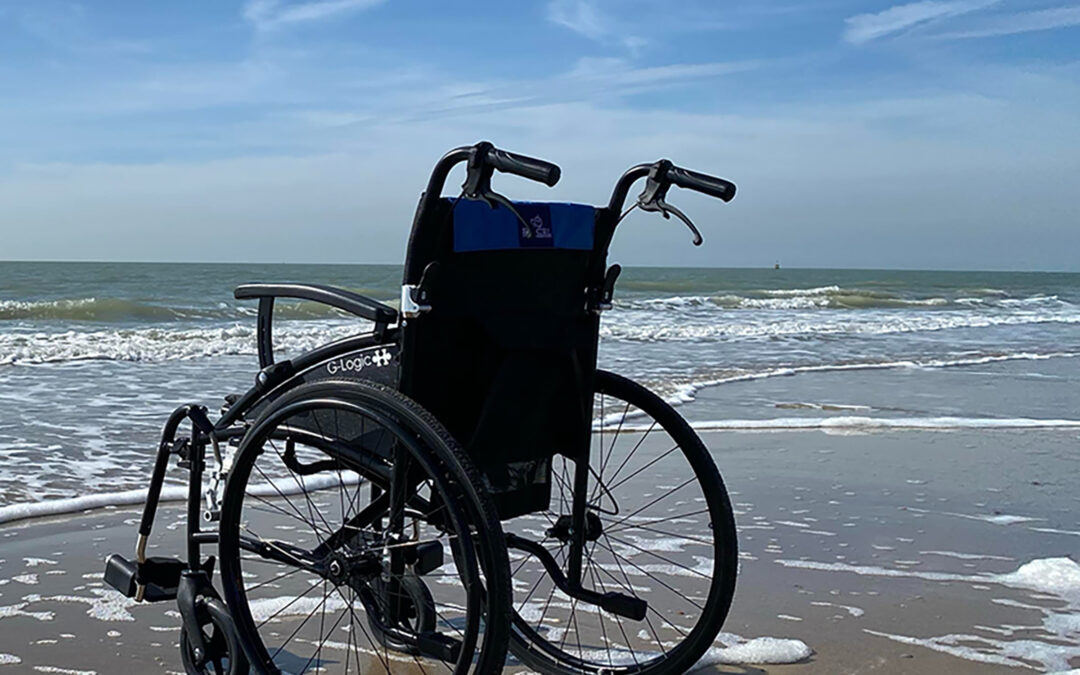Don’t conflate disability with suffering.
by Amy Kenny
I AM CERTAINLY NOT THE FIRST PERSON to think of God as disabled. Nancy Eiesland, who pioneered disability theology, imagined God in a sip-and puff wheelchair. After a friend declared that her disability would be removed in heaven, Eiesland was horrified because she felt that would erase a part of who she was and how she understood God. To nondisabled people, this is particularly difficult to understand because of the hypothesis that disability is always bad or a result of the Fall [the first sin of Adam and Eve, and] something to be redeemed from in the new creation. To imagine God as disabled seems to diminish God’s power or presence.
“God can’t be disabled,” they inform me.
“That’s insulting to the heart of the Creator of the universe,” another retorts.
What’s insulting to God is when we don’t consider disabled people image-bearers. Or when we can only imagine paradise by erasing one-quarter of humanity. Or when we don’t feed the least of these when it is well within our power to do so.
I am not interested in adding to the will-we-or-won’t-we-be-disabled- in-heaven conversation. On some level, it doesn’t matter if our heavenly bodies will be disabled or not. No one can know that. It is out of my control and does nothing to restore the way I am treated now. But at the very least, I would like to be able to go to church without listening to folks impose their unexamined theology on me.
Without being bombarded with so many “somedays” and “at leasts” and “you’ll be running/kick- boxing/flying/fixed/whole/human in heaven.”
How we think about eschatology influences how we treat people today. We can’t simply put eschatology in another box in our brains. If we believe that disabled people are not whole until they cross an enchanted threshold into the afterlife, that will certainly impact the way we engage with them in the here and now. We talk about God’s kingdom as the now and not yet: the in-between space that we get glimpses of but are not fully a part of yet. Treating disabled people as image-bearers only once we get to the “not yet” impacts the “now.” Let disabled people lead in imagining what new creation could be for us. For some, that’s using wheelchairs; for others, it is not. For some, it includes God using ASL [American Sign Language]. For others, it means seeing. Who’s to say it will be the same for all of us? The disability community is a diverse group of various physicalities, mentalities and beliefs. Learn from us when we tell you how we imagine restoration. Let our imaginations for restoration light the way.
There are those who will counter that I am a beloved child of God, so it doesn’t matter what my body looks like or how it functions. This one is well-intentioned, but it fails to understand a key aspect of my identity. I am disabled. I don’t say that to garner pity or to overemphasize my disability. I fully recognize that it is not the totality of my identity either. But the truth is, being disabled is a core part of the way I interact with the world and with God.
Kind acquaintances often want to justify erasing disability by claiming that it just doesn’t matter. “God doesn’t see you as disabled,” they promise. Why should it matter if we celebrate that there are no more disabled people in heaven, when your core identity is in Christ? Here’s why it matters. Imagine if folks cheered for a song that touted “no more brown eyes in heaven.” That’s a quality that you didn’t choose, and you can’t change. Perhaps some days you don’t even like your brown eyes. None of us can know if our eye color will endure in a new-creation reality. But a whole crowd chanting, cheering, and celebrating that your eyes won’t be brown might feel a bit squidgy. Imagine how you might feel with them belting out, “No more brown-eyed girls, because we’ll finally be healed and whole.” Guess God isn’t a fan of Van Morrison.
Folks who want to erase my disability in the name of embracing how God understands me are still erasing my disability. The idea that our bodies don’t matter to God is a lovely idea that comes from a warm place with a cozy blanket, but it is not true. To be sure, I am a beloved child of God, but it does matter what happens to my body. Our bodies matter. If they didn’t, why would Jesus bother with the incarnation? Seems messy to go through all that spit and sweat and suffering if it was merely about souls. Jesus could have snapped a finger, Thanos-style, and waved goodbye to the dominions of darkness. It certainly would have been so much cleaner (and less painful) that way.
But Jesus chose to take on a body and enter what it means to be human, even all the snotty bits we blush about. The Word became flesh, and we try to turn it back into words again. Our theology is incarnational because bodies matter.
Amy Kenny is a Shakespeare scholar and the author of My Body is Not a Prayer Request (Baker Publishing 2022).
This is excerpted from an article in the March/April 2023 issue. To read more articles like it, subscribe to Gather.

Seen. Heard. Welcomed.
Do you ever go to church hoping you have enough snacks and “stuff” to keep your child quiet and...

Redeeming grace
Coupons, rainchecks and rebates were my dad’s way of saving money on groceries and other household...

Holding to God’s promise
When my husband, Joe, and I moved into our first house In May 2014, we spied squash vines growing...


